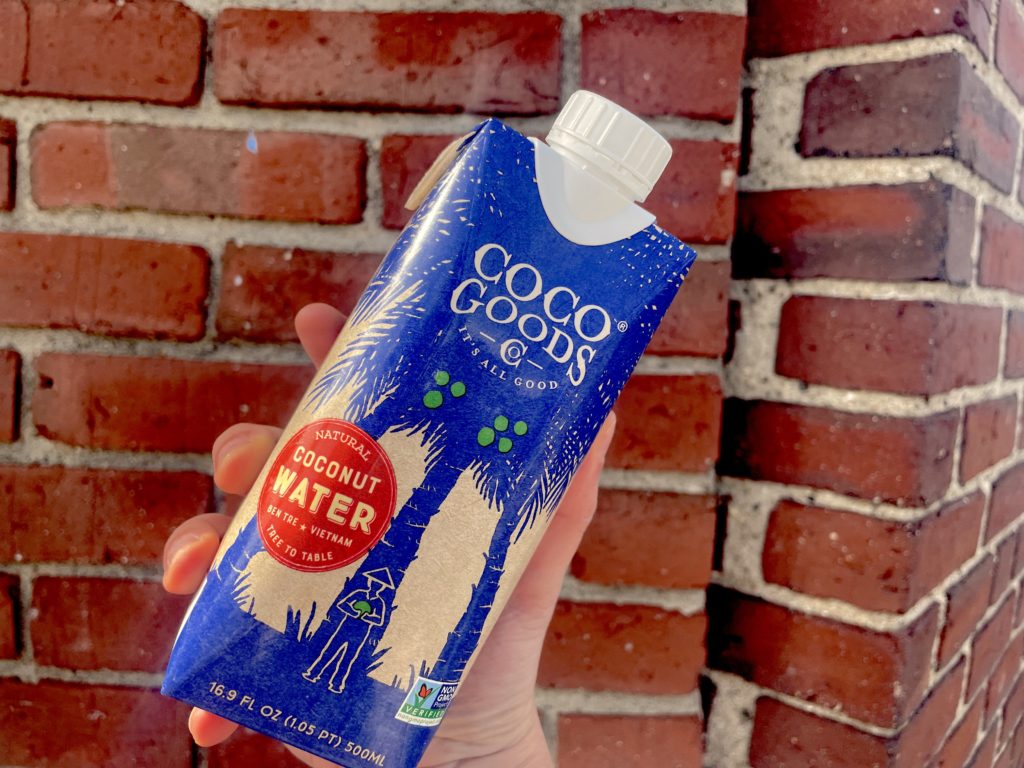
Long enjoyed by island and coastal populations in Costa Rica, India, Sri Lanka, Indonesia, Mexico, and more, the coconut water craze has exploded within mainland USA—shifting from a $35 million dollar industry to $1.5 billion from 2004 to 2018. More than just a delicious drink, recent studies have linked coconut water to a range of health benefits—from heart health to increased energy.
Ready to hop on the coconut water train? Learn about coconut water’s health benefits, uses, and the best brands to support below.
Coconut Water Health Benefits
Considered nature’s Gatorade, coconut water is the healthier, less sugary alternative for that post-workout drink. Keep coconut water in your pantry for when you’re sick or recovering from a hangover thanks to the following health benefits found in this delicious drink:
- Potassium-Packed – Containing more potassium than a banana (800 mg compared to 326 mg), coconut water helps people reach their recommended daily intake of potassium (4,700 mg per day). Potassium helps maintain fluid levels within our cells, regulates the heartbeat, and maintains a healthy blood pressure.
- Electrolyte-Rich – Potassium, sodium, magnesium, and calcium are all vital electrolytes which help rehydrate the body. Coconut water contains all four electrolytes, making it the perfect sports drink replacement. (Note: Hydration is still best accomplished through plain water.)
- Vitamin C Filled – Offering 24mg of vitamin C per cup, coconut water contains nearly 32 percent of a woman’s recommended vitamin C intake and 27 percent of a man’s recommended intake. Vitamin C helps control infections, heals wounds, and helps create collagen within the body. Deficiency in vitamin C can lead to scurvy, fatigue, and anemia.
Tips for buying Coconut Water
Best processes and pure ingredients
When buying coconut water in the store, it’s important to remember that not all coconut water brands are created equally. As you shop for your own coconut water, keep these things in mind.
- Look for sugar-free. Many coconut water brands add sweeteners to the coconut water to mask any bitterness in taste. Check the label to make sure there’s little to no added sugar for a fresh and healthier alternative.
- Check that the coconut water is not derived from concentrate. Reconstituting concentrate is far more affordable for brands than shipping fresh coconut water, but it comes with a separate kind of cost. By creating the syrup concentrate, manufacturers heat coconut water to extremely high temperature for a long period of time. This causes the coconut water to lose nutrients and decrease the effectiveness of beneficial enzymes. When purchasing coconut water, make sure the label says “Not from Concentrate” on the bottle.
- Choose organic. Hidden chemicals like metabisulphite and preservatives can lurk in coconut water brands to help secure shelf life and color consistency. To avoid these, make sure the only ingredient listed is ‘coconut water’ for selected brands.
Recommended Coconut Water Brands That We Love
If you’re feeling overwhelmed by all the above considerations, don’t be! At Peaceful Dumpling, we’ve rounded up some of our favorite coconut water brands guaranteed to leave you feeling happy and healthy with their delicious and nutritious products.
- Vita Coco – During a visit to Maui, I drank Vita Coco nearly every day. Ultra refreshing with a clean taste, Vita Coco boasts only 60 calories per container. The only ingredients are coconut water, less than one percent of sugar, and vitamin C for a preservative-free treat.
- Coco Goods – In Boston, my local grocery store carries Coco Goods and it’s so worth the extra price for the quality of its product. 100% organic with no sugar added, Coco Goods’ coconut water makes you feel good inside and out. Coco Goods commits to environmental justice through its use of sustainable factories and by investing $3 million in solar energy.
- Harmless Coconut Water – With a rating of 100/100 on the GreenScore scale, Harmless Coconut Water tops charts in terms of its nutrition, environmental impact, processing, and food safety methods. Working to source coconut water as ethically as possible, Harmless Coconut Water focuses on regenerative agriculture and is certified fair-for-life. Bottles are also made from 100% recycled plastics for added environmental benefits.
- DIY – for the most sustainable option, you can DIY your zero-waste coconut water with a coconut and a hammer. Here’s how to do it.
***
Next time you’re in the store, ditch the sugar-filled Gatorade for nature’s natural Gatorade instead. Low in calories, electrolyte-packed, and filled with potassium, coconut water is a must-have for summer sweats, winter colds, and everything else in between.
Get more like this—Sign up for our daily inspirational newsletter for exclusive content!
__
Photo: Dana Drosdick




